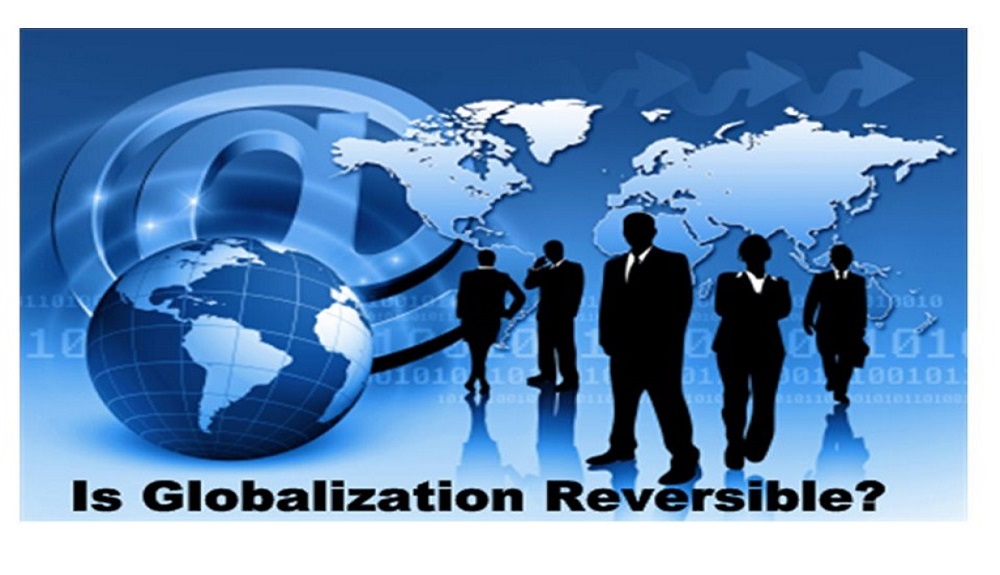October 10, 2022
Is globalization reversible in the Today’s VUCA global economy?
To start on the right footing, one needs to define/describe globalization and its overarching objectives. Globalization involves a shift towards a more progressively integrated interdependent world economy. The primary drivers of globalization include but are not limited to sociocultural, technological, economic, ecological, and political forces. Globalization has transformed how businesses operate, compelling companies to reassess and or change their organizations and open minds and boundaries. The question facing large numbers of organizations today is no longer whether to globalize but how to effectively compete in an increasingly integrated, interdependent, uncertain, complex, and hyper-competitive world economy. Globalization is shrinking the world, and its components, notably international trade, have enabled world economic output to balloon to $85.9tril in 2018, up from $34tril (at current prices) in 2000 (Statista, 2021). However, global GDP growth dipped a modest 3.3% in 2020 to $84.7tril from $87.6tril (at current prices) in 2019 due mainly to the SARS Cov-2. Are you waiting for it? Statista projects global GDP to expand 6.03% in 2021, 4.42%, and 3.5% in 2022 and 2023, respectively, taper off to circa 3.3% from 2024 through 2026. To name two, multilateral organizations, including the World Bank and OECD, also forecast similar global GDP growth rates as Statista. These projected growth rates are decent relative to the average historical growth rates from 2011-2018, thus supporting the case for embracing international trade underpinned by the Ricardian theory of comparative advantage. What this means at the fundamental level is that when countries embark on international trade, they must give up something used in producing one good to get another good from their trading partner(s). In economics jargon, As long as the relative opportunity costs of producing goods (what must be given up in one good to get another good) differ among countries, then there are potential gains from trade. Globalization has been with us for more than 200 years, but in this 21st century, it has no doubt become the protectionist/isolationist boogeyman. The argument follows that globalization damages the environment and threatens our American, European, and other developed nations’ jobs and livelihood. Yes, this is a valid argument. So, is and or will globalization be in retreat in the wake of Brexit and the SARS Cov-2 pandemic, or is it doomed to failure or reversible in the extended run framework? I would not bet the farm on globalization’s demise, albeit severe future externalities ala another global pandemic or major disruptive geopolitical events may moderate international trade and globalization. Nonetheless, the writer’s perspective favors a potential acceleration in the pace of globalization. Why? a new trade phenomenon, globality (coined by Daniel Yirgin in 1998 to describe the end state of globalization may be creeping up given that twenty-first-century consumers demand innovative higher quality products and services at relatively lower/affordable prices. According to Wikipedia, Globality is the “end-state of globalization– a hypothetical condition in which the process of globalization is complete or nearly so, barriers have fallen, and “a new global reality” is emerging”. One could argue that BCG’s Hal Sirkin advanced a more succinct definition/description of globality as “Globality is competing with everyone from everywhere for everything”. Why the confidence in the opinion that globalization is NOT reversible? Trade agreements have become virulently partisan and emotionally driven with little regard to objectively debating the net effects of globalization. The two prime trade theories widely accepted by economists are a) the Ricardian theory based on relative productivities and b) the Heckscher Olin theory derived on factor endowments. Tests on the Ricardian theory, which measures the relative differences in labor productivities between pairs of countries as the source of comparative advantage, have been largely successful. In contrast, tests on the Heckscher-Olin theory, which measures factor endowments, yielded mixed results. Now, in 1985 only nineteen trade agreements were in force worldwide, but these agreements mushroomed to 132 during the first decade of the 21st century. Globalization is not a zero-sum game, and yes, some of our biggest trading partners have trade policies that discriminate/disadvantage U.S. entities. For instance, the average U.S. tariff on imports was circa 3.5% (2014), while the tariff rates of our major trading partners ranged from 9.6%, 7.5%, 5.3%, and 4.2%. Let us ask the poignant question though, where are the most opportunistic / growth markets today and in the near, intermediate, and long-run frameworks? Is it EU, the U.S., South America, Asia, Africa, MENAT, or Central and Eastern Europe? Without free and fair trade agreements, U.S. entities risk paying higher tariffs on their exports. Further, the most opportunistic markets during the first half of the 21st century are outside the EU-US. What are the optimal risk-adjusted course(s) of action available to developed nations SMEs to goose global sales and profitability? One may not wholly dismiss the U.S.’ ambivalence or caution against embracing globalization despite the overwhelming support from business leaders, academics, and economists. But then again, is protectionism/isolationism or retreat from globalization the optimal answer to this vexing issue? Everyone should understand and remember that globalization is not a zero-sum game. Nonetheless, we (the U.S.) must also hold our trading partners accountable to their WTO promises/obligations. Is globalization reversible in today’s VUCA global economy? Empirical and anecdotal evidence thus far suggests that globalization is not reversible in the 21st century’s VUCA global economy.
Subscribe
Login
0 Comments
Oldest





